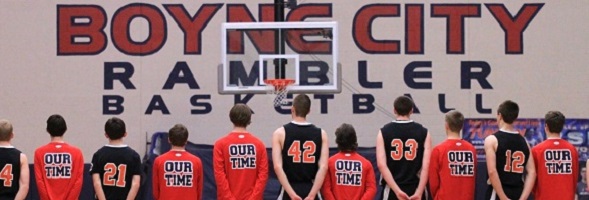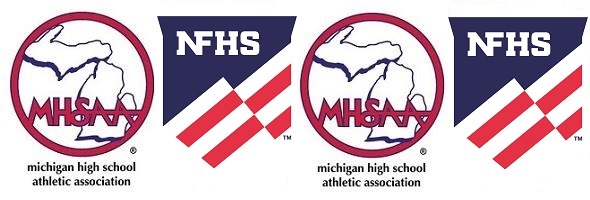
Graduation of Multi-Sport Athletes
December 8, 2014
By David Smith
Boyne City athletic director
Editor’s Note: This is reprinted with permission from the Petoskey News-Review, which is publishing semi-regular columns written by athletic directors for the northwest region of the Lower Peninsula. Click for more sports coverage from the News-Review.
There are many important topics today that relate to high school sports. I was honored when asked to write a brief column about a current topic of my choice in the high sports world. This particular topic, student-athletes specializing in one sport, is something that is happening more and more.
It’s hard to pinpoint exactly why this is, but it often times seems to boil down to unrealistic expectations from several parties that an athlete is capable of being a legitimate college or higher-level athlete.
Don’t get me wrong, we have a plethora of outstanding athletes in Northern Michigan. The facts are, however, that about 98 out of 100 high school athletes never play collegiate sports of any kind at any level. Also, less than one percent of high school athletes receive a scholarship of any kind to a Division I school.
I don’t want to tell someone not to have that dream. In fact, I think that is an awesome dream to have. I had that goal growing up and was fortunate to be able to play a few different sports at a small Division III college. It helped me grow immensely as a person, and I’m very thankful for that experience. I just can’t emphasize enough how we need to all have realistic expectations for our student athletes, whether it’s the athletes themselves, or parents, coaches, administrators, etc.
I think one thing we can all do to help this is to emphasize the process more than the outcome. The funny thing is getting the process right and enjoying it almost always leads to positive outcomes. The process is where all the hard work is put in. The process is where good character is developed, and that’s one of the most important traits we can help young individuals develop.
Many high school athletes are also too busy and compete too much. The amount of young athletes competing year-round for sports is getting out of control. Sure, sometimes it works out and an athlete will really improve by doing this, but more often than not, they get burned out and when it’s actually that sport in-season, they are toast and go through the motions. I know from a coaching standpoint I want athletes hungry to compete every time out.
Being that busy also means very little time for athletes to improve their overall athleticism (stronger, faster, quicker, more explosive, better endurance, etc.). Skills take a back seat too because most athletes are just playing games and not focusing on skill work. I’d rather take an athlete who trains to become more athletic and works on skills for several months than one who plays AAU or something of that nature. I know that has its place for a very few individuals, but most young athletes need way more work on their athleticism and skills before being ready for something like AAU.
I get specializing in one sport if you are undoubtedly a Division I athlete that will likely play professionally. Or maybe it’s someone who goes to a big high school and they aren’t very talented so the only way they can play is to focus really hard on one sport. I get those occurrences.
I would argue, however, that even the Division I-type individuals will nine times out of 10 benefit more from playing another sport because they aren’t going to work hard enough by themselves to make the gains. They would then also be refreshed and ready to get after it once the season arrives. With that, our schools up here will always have a hard time competing at the regional and state level if we don’t have all of our best athletes playing two or three sports. It blows me away how good some of our teams in the area could fare if this happened.
This column is not meant to be negative. It’s just some food for thought. I haven’t been at this very long, but it’s something I’ve seen happen more and more in the last 10 years. I’ve just always been a big fan of the multiple sport athlete and experienced first-hand how much a school can benefit when a group of talented athletes go through and they all play a minimum of two sports.
At the end of the day, we cannot forget what I’d consider the main purpose of athletics at this level. That is, to help young individuals leave our schools with experiences and life lessons that will help them as they pursue careers and go on with other facets of their lives.

Adult Fans: HS Sports' Biggest Challenge
August 27, 2019


By Karissa Niehoff, NFHS Executive Director
and Mark Uyl, MHSAA Executive Director
Inappropriate adult behavior at high school athletic events in Michigan has reached epidemic proportion.
When more than 2,000 high school athletic directors were asked in a recent national survey what they like least about their job, 62.3 percent said it was “dealing with aggressive parents and adult fans.”
And the men and women who wear the black and white stripes agree. In fact, almost 80 percent of officials quit after the first two years on the job, and unruly parents are cited as the reason why. As a result, there is a growing shortage of high school officials here in Michigan, and in some sports like wrestling, swimming & diving and track & field, the shortage is severe. No officials means no more games.
If you are a parent attending a high school athletic event this fall, you can help by following these six guidelines:
1. Act Your Age. You are, after all, an adult. Act in a way that makes your family and school proud.
2. Don’t Live Your Life Vicariously Through Your Children. High school sports are for them, not you. Your family’s reputation is not determined by how well your children perform on the field of play.
3. Let Your Children Talk to the Coach Instead of You Doing It for Them. High school athletes learn how to become more confident, independent and capable — but only when their parents don’t jump in and solve their problems for them.
4. Stay in Your Lane. No coaching or officiating from the sidelines. Your role is to be a responsible, supportive parent — not a coach or official.
5. Remember, Participating in a High School Sport Is Not About Getting a College Scholarship. According to the NCAA, only about two percent of all high school athletes are awarded a sports scholarship, and the total value of the scholarship is only about $18,000.
6. Make Sure Your Children Know You Love Watching Them Play. Do not critique your child’s performance on the car ride home. Participating in high school sports is about character development, learning and having fun — not winning and losing.
Purchasing a ticket to a high school athletic event does not give you the right to be rude, disrespectful or verbally abusive. Cheer loud and be proud, but be responsible and respectful. The future of high school sports in Michigan is dependent on you.
The Michigan High School Athletic Association (MHSAA) is one of 51 members of the National Federation of State High School Associations (NFHS).

